Child adjustment is strongly influenced by parental adjustment, as parents' emotional stability directly affects children's behavior and mental health. Explore how nurturing parental well-being fosters positive child development in this article.
Table of Comparison
| Aspect | Child Adjustment | Parental Adjustment |
|---|---|---|
| Emotional Stability | Varies; may face anxiety or stress due to new family dynamics | Often challenged by role changes and relationship redefinition |
| Behavioral Changes | Possible behavioral issues or increased independence | Adjustment in parenting style and communication needed |
| Relationship Building | May experience difficulty bonding with stepparents or stepsiblings | Focus on building trust and cooperation with new family members |
| Support Systems | Benefit from consistent support from both biological and stepparents | Seek external support for co-parenting and blended family challenges |
| Adaptation Timeline | Adjustment may take months to years depending on age and circumstances | Parental adaptation often gradual with ongoing negotiation |
Understanding Child Adjustment: Key Factors
Understanding child adjustment involves examining emotional, social, and behavioral development in response to environmental changes. Key factors influencing adjustment include parental support, family stability, and the child's temperament, which interact to shape coping mechanisms. Your awareness of these elements can guide effective strategies to foster positive outcomes in child development.
Defining Parental Adjustment: Roles and Responsibilities
Parental adjustment involves adapting to the evolving roles and responsibilities of parenthood, including emotional regulation, effective communication, and providing consistent support to foster a stable environment. This process directly influences child adjustment, as well-adapted parents model resilience and coping strategies essential for children's social and psychological development. Understanding parental adjustment is crucial for developing interventions that enhance family dynamics and promote healthy child outcomes.
Psychological Impacts on Children During Transitions
Psychological impacts on children during transitions vary significantly depending on child adjustment and parental adjustment, both of which critically influence emotional stability and coping mechanisms. Effective child adjustment is associated with reduced anxiety and better social competence, while parental adjustment fluctuations can heighten children's stress levels, triggering behavioral issues and emotional distress. Research highlights that synchronized positive adjustments in both parents and children foster resilience and promote healthier psychological development during transitional phases.
Parental Well-being and Its Influence on Child Outcomes
Parental well-being plays a crucial role in shaping child adjustment, as parents experiencing high stress or poor mental health may struggle to provide consistent emotional support and effective parenting. Research indicates that positive parental adjustment, including managing stress and maintaining psychological health, directly enhances children's social, emotional, and behavioral outcomes. Fostering parental well-being through interventions and support systems creates a resilient family environment that promotes healthier child adjustment and long-term developmental success.
Strategies for Supporting Child Adjustment
Effective strategies for supporting child adjustment include fostering secure attachments through consistent caregiving and promoting emotional regulation skills tailored to the child's developmental stage. Parental adjustment significantly influences child outcomes; therefore, interventions aimed at reducing parental stress and enhancing coping mechanisms indirectly benefit the child's adaptive capacity. Incorporating family-based approaches that target both child and parental well-being optimizes resilience and facilitates smoother transitions during periods of change.
Approaches to Enhance Parental Adjustment
Approaches to enhance parental adjustment emphasize emotional support, stress management techniques, and parenting skill development to improve overall family dynamics. Evidence-based interventions such as cognitive-behavioral therapy and mindfulness practices have shown effectiveness in reducing parental anxiety and increasing resilience. Strengthening parental adjustment directly fosters a supportive environment that positively influences child adjustment and behavioral outcomes.
Comparing Emotional Responses: Child vs. Parent
Emotional responses in child adjustment often manifest as anxiety, mood swings, and behavioral changes, whereas parental adjustment typically involves stress, guilt, and coping challenges. Children rely heavily on parental emotional stability, making parental adjustment crucial for a child's healthy emotional development. Research indicates that effective parental emotion regulation directly improves children's emotional resilience during periods of change.
Communication Dynamics Between Parents and Children
Effective communication dynamics between parents and children significantly influence both child adjustment and parental adjustment, fostering emotional security and behavioral stability. Clear, empathetic dialogue helps children develop resilience and social competence, while parents adapt their strategies to meet evolving needs, promoting mutual understanding. Disruptions in these communication patterns often correlate with increased stress and maladjustment, highlighting the critical role of open, consistent exchanges in healthy family functioning.
Navigating Challenges Together: Building Family Resilience
Navigating challenges together strengthens family resilience by enhancing both child adjustment and parental adjustment. Your ability to support each other promotes emotional stability, effective communication, and adaptive coping strategies within the family unit. Fostering mutual understanding during stressful times directly influences children's behavioral and emotional development, contributing to overall family well-being.
Measuring Success in Adjustment: Indicators and Outcomes
Measuring success in adjustment involves evaluating behavioral, emotional, and social indicators in both children and parents, where child adjustment is assessed through academic performance, peer relationships, and emotional well-being. Parental adjustment encompasses stress levels, parenting practices, and mental health status, which significantly influence child outcomes. Comparative analysis highlights that while child adjustment outcomes reflect immediate adaptive behaviors, parental adjustment serves as a foundational predictor for long-term child resilience and developmental success.

Infographic: Child adjustment vs Parental adjustment
 relatioo.com
relatioo.com